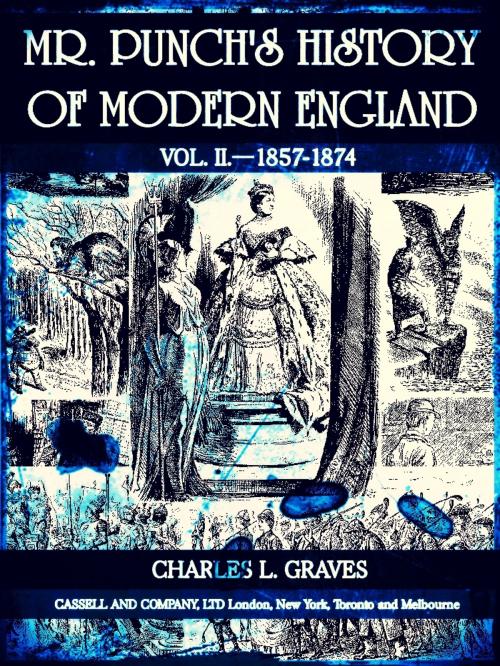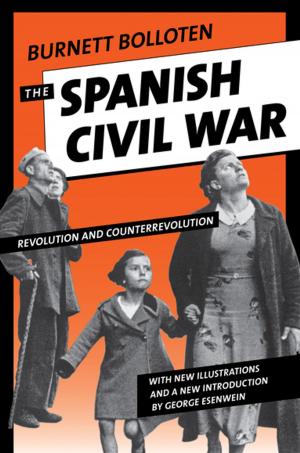Mr. Punch's History of Modern England Vol. II—1857-1874 (of 4 ) (Illustrations)
Nonfiction, History, European General, British, Military| Author: | Charles Larcom Graves | ISBN: | 1230000282512 |
| Publisher: | CASSELL AND COMPANY, LTD | Publication: | November 25, 2014 |
| Imprint: | Language: | English |
| Author: | Charles Larcom Graves |
| ISBN: | 1230000282512 |
| Publisher: | CASSELL AND COMPANY, LTD |
| Publication: | November 25, 2014 |
| Imprint: | |
| Language: | English |
Example in this ebook
PART I
THE NATIONAL OUTLOOK
Mr. PUNCH'S HISTORY OF MODERN ENGLAND
THE AGE OF NON-INTERVENTION
"Whether splendidly isolated or dangerously isolated, I will not now debate; but for my part I think splendidly isolated, because this isolation of England comes from her superiority."
These words were used by Sir Wilfrid Laurier in 1896, but they were prompted by a retrospect of the Victorian age, and may serve as a motto for the policy which governed England in her relations with foreign countries in the period surveyed in this volume.
There was serious friction with France in the early days of the Empire owing to the distrust of the Emperor's warlike preparations and his manipulation of the opportunities presented by his assistance of Italy in 1859. In the war of North and South in America, England as a whole "backed the wrong horse," and English diplomacy mishandled the obligations of our neutrality. We were on the verge of war over the Trent case, and the slackness of the Government in failing to detain the Alabama burdened the country with a costly legacy of moral and intellectual damage—to say nothing of pecuniary loss.
Popular sentiment was strongly anti-Prussian in the war on Denmark in 1864; misgivings of Prussian aggression were heightened by the crushing defeat of Austria in 1866 and the French débâcle in 1870. Yet the old diplomacy, whatever its shortcomings, kept us out of European wars. The Court as well as the Government strove hard for peace in 1859; the Queen's influence was successfully exerted to prevent interference on behalf of Denmark in 1864, which had been foreshadowed in a menacing message to Austria from Lord Palmerston. After the defeat of the Austrians at Sadowa in 1866, Disraeli justified abstention from unnecessary interference in European politics, on the ground that England had outgrown the European Continent, and was really more of an Asiatic than a European power. With Gladstone the restraining motive was economic rather than anti-imperialist, though his distrust of a "spirited foreign policy" became more pronounced in later years. But under Liberals and Conservatives alike, non-intervention in European wars remained the unbroken rule, and the only serious military operations undertaken between 1857 and 1874 were those involved in the suppression of a great revolt within our own dominions. The Chinese quarrel was the only cloud on the horizon in the beginning of 1857. Parliament was dissolved as the result of the vote of censure passed in the Commons, but Palmerston was returned with a strong majority, and the pacificists under Cobden lost their seats, Punch expressing the hope that Cobden might be "master of himself though China fall."
The war with China was not a glorious page in our annals: it remained in abeyance during the Mutiny and was not concluded till 1860. Indirectly it was one of the means of saving India by the diversion of the troops intended for the Far East, and already at Singapore, to the relief of Bengal at the urgent summons of Lord Canning, the Governor-General of India. The first mention of the outbreak in Punch followed close on the tragedy of Meerut early in May. In his "Essence of Parliament" we read:—
Lord Ellenborough delivered an alarmist speech about the mutinies in our Indian Army. Among other terrors, he was hideously afraid that Lord Canning, the Governor-General, had been taking some step which showed that he thought Christianity a true religion, but this damaging accusation was happily explained away. Lord Lansdowne was almost sure that Lord Canning could not so far have misconducted himself.
To be continue in this ebook
Example in this ebook
PART I
THE NATIONAL OUTLOOK
Mr. PUNCH'S HISTORY OF MODERN ENGLAND
THE AGE OF NON-INTERVENTION
"Whether splendidly isolated or dangerously isolated, I will not now debate; but for my part I think splendidly isolated, because this isolation of England comes from her superiority."
These words were used by Sir Wilfrid Laurier in 1896, but they were prompted by a retrospect of the Victorian age, and may serve as a motto for the policy which governed England in her relations with foreign countries in the period surveyed in this volume.
There was serious friction with France in the early days of the Empire owing to the distrust of the Emperor's warlike preparations and his manipulation of the opportunities presented by his assistance of Italy in 1859. In the war of North and South in America, England as a whole "backed the wrong horse," and English diplomacy mishandled the obligations of our neutrality. We were on the verge of war over the Trent case, and the slackness of the Government in failing to detain the Alabama burdened the country with a costly legacy of moral and intellectual damage—to say nothing of pecuniary loss.
Popular sentiment was strongly anti-Prussian in the war on Denmark in 1864; misgivings of Prussian aggression were heightened by the crushing defeat of Austria in 1866 and the French débâcle in 1870. Yet the old diplomacy, whatever its shortcomings, kept us out of European wars. The Court as well as the Government strove hard for peace in 1859; the Queen's influence was successfully exerted to prevent interference on behalf of Denmark in 1864, which had been foreshadowed in a menacing message to Austria from Lord Palmerston. After the defeat of the Austrians at Sadowa in 1866, Disraeli justified abstention from unnecessary interference in European politics, on the ground that England had outgrown the European Continent, and was really more of an Asiatic than a European power. With Gladstone the restraining motive was economic rather than anti-imperialist, though his distrust of a "spirited foreign policy" became more pronounced in later years. But under Liberals and Conservatives alike, non-intervention in European wars remained the unbroken rule, and the only serious military operations undertaken between 1857 and 1874 were those involved in the suppression of a great revolt within our own dominions. The Chinese quarrel was the only cloud on the horizon in the beginning of 1857. Parliament was dissolved as the result of the vote of censure passed in the Commons, but Palmerston was returned with a strong majority, and the pacificists under Cobden lost their seats, Punch expressing the hope that Cobden might be "master of himself though China fall."
The war with China was not a glorious page in our annals: it remained in abeyance during the Mutiny and was not concluded till 1860. Indirectly it was one of the means of saving India by the diversion of the troops intended for the Far East, and already at Singapore, to the relief of Bengal at the urgent summons of Lord Canning, the Governor-General of India. The first mention of the outbreak in Punch followed close on the tragedy of Meerut early in May. In his "Essence of Parliament" we read:—
Lord Ellenborough delivered an alarmist speech about the mutinies in our Indian Army. Among other terrors, he was hideously afraid that Lord Canning, the Governor-General, had been taking some step which showed that he thought Christianity a true religion, but this damaging accusation was happily explained away. Lord Lansdowne was almost sure that Lord Canning could not so far have misconducted himself.
To be continue in this ebook















